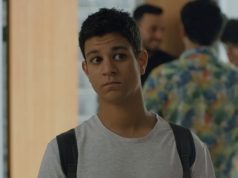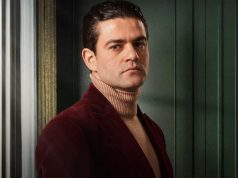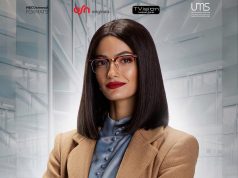A quick chat with Mohamed Hatem let us in on the many aspects of theater and his newest role in the TV Series Qasr El Nil alongside Dina El Sherbiny. He shares with us how his personal experiences affect his acting style and what his future plans are.
By Mariam Elhamy
What excites you most about filming the Ramadan series Qasr El Nil?
First of all, I am excited to be working with a big director who I’ve worked with before on Tariqi and Grand Hotel, Khaled Marei. I have followed and loved his work for years. The scenario for Qasr El Nil, written by Mohamed Soliman Abdul Malek, got me hooked and I felt that it was different and filled with fascinating details.
The role is different than anything I’ve done before. It is presented in an interesting way, with flashback scenes mixed with current events allowing the audience to really understand the characters.
Without too many spoilers, what can you tell us about the storyline and your role?
I play Hussein El Seyoufi, the youngest of Fahmi El Seyoufi’s sons from his second wife who is Egyptian. All his life he has been treated as less than his siblings because he wasn’t brought up in the same luxurious environment.
As a kid he was subjected to a lot of psychological stress at home and this made him look for his identity somewhere else far away from the palace. He decided to join a left-wing camp as a way to search for his identity.
He then gets captured and released after he makes a deal with an officer to be the government’s eyes through the palace. Being a part of the family but politically against them is the conflict. As he tries to find his place back in the family, after he has been mistreated in the past, now the circumstances push him to become the most important member of the family.
Do you draw on personal experience in your roles?

I believe that an actor reflects his character on any role he plays. Starting with when he works on and studies the script till the moment he acts it out in the scene. An actor’s personal experience always shows in his eyes.
The 60s era stands out for so many things, how did you delve into the mood and bring this to your performance?
It all starts with studying the script; it opens many doors for me while I’m developing the character. When I read Qasr El Nil’s script for the first time, I found the story to be very strong and overpowering, and I felt I was a part of it as if I’m telling a thrilling story. Before filming started I read and studied a lot about the people in this era, especially politically.
Costume-wise I talked a lot with stylist Dina Nadim, who is excellent. We went back and forth with photos and suggestions for the wardrobe that would suit this era. What got me in the mood the most is when I finally wore the outfit and saw my complete look. Also seeing the other actors in costume and the location helped a lot.
You are working with Dina El Sherbiny in Qasr El Nil, after both working on Grand Hotel some years back. How is it to catch up?
Dina El Sherbiny is a very distinct actress who knows how to evolve quickly; she is very smart, fascinating and dedicated to her work. This has been my opinion on her ever since I worked with her on Grand Hotel and she was doing Afrah El Qubba at the same time. I am very happy to be working with her again, I love the scenes we do together and I love our chemistry.
What role or genre would you really like to tackle in the near future?
I really want to do a comedic role, and I want to work in cinema.
Do you draw on your considerable stage experience in your on-screen work, and if so, how does it help your performances?
Theater for me is a place of experimentation, like an actor’s gym. Being in theater is helpful to any actor with things like connecting with the other actor in front of him, his body and the rhythm of the scene generally.

There is no wrong or right in theater, it gives you a certain freedom that when someone makes a mistake, the show goes on and sometimes that mistake becomes the best part of the show.
Theater has a wide scope of characters and very well-written scripts, which is rare nowadays. In theater, you get to do classics written by great writers like Shakespeare, Molière and Tennessee Williams, doing plays for these giants allows you to touch on some parts in acting that you normally wouldn’t.
What do you currently have in the pipeline?
I’m currently focused on Qasr El Nil. I don’t have any new projects except theater. I’m playing in Mama directed by Ahmed El Attar, which we played at Avenue Festival 3 years ago. It will be performed at Rawabet Theater and the cast includes Ramsi Lehner, Menha Batraoui and Nanda Mohamed.
I’m also playing in Nehayet El Hob directed by French director Pascal Rambert, also being performed at Rawabet theater by the end of this year. I’m very excited to do theater again and I hope it comes back in the whole world.
Quickfire Round:
Most life-changing experience?
The moment I decided to quit the bank that I used to work at and devote myself to acting.
Biggest regret?
I don’t think I have any. I’m happy with my life and I believe that everything happens for a reason.
Hobbies?
I love photography very much.








